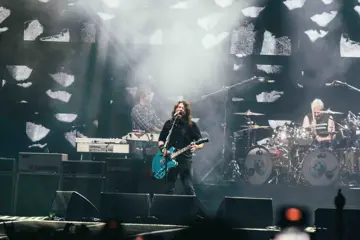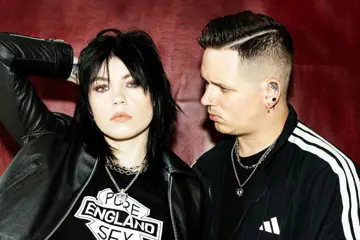Sydney's Seekae have superseded perceived notions of niche audiences by taking their fusion of frenetic live instrumentation with stark electronica into the mainstream consciousness, attracting ever increasing crowds that straddles many musical touchstones. The trio – Alex Cameron, George Nicholas and John Hassell – take pride in the fact that they are utilising the aesthetics of electronica through the “limited” prism of live instrumentation.
“We've been kicking around for five years now, since we left high school, and [2011 album] +Dome was a reaction to having played a lot live, and having played with instruments,” Cameron explains. “We wanted to create something new to us, so the songs are us recording with real instruments, real takes, then sampling from them and changing them, intentionally leaving slight errors, little 'happy accidents'. A lot of the grooves in these tracks are a result of that, from layering takes over time and highlighting a little of the human error in there, so those mistakes are made to happen because the samples become flawed in a way.”
This unique viewpoint of seeking out the groove inherent in the music through a Jenga style of construction and composition may have been a kneejerk reaction to the rigours of being lumped with limited scope when handed a live instrument, but it's also been a reaction to the staid nature of the live electronic experience. It's an approach that took some time to come into focus for the band, yet the end result coalesced from a unique perspective.
“When we were eighteen, nineteen, we wanted to make this stark music that was mainly digital or synthetic in nature. So our first record encompassed that – it was very electronically based and surrounded by synthesisers and percussion, taking away the human element as much as we could. But then we felt we wanted to do the opposite, we wanted something that sounded like a robot trying to imitate a human. At least for me, I think that is what electronica should be – overproduced, computer-sounding pop songs, but that are yearning to be human. Computers should sound like a big performance, because for me computers and technology are the roots of our time and culture – it's ingrained into us, and that should be reflected in the music.”
Don't miss a beat with our FREE daily newsletter
Despite its experimental nature, the inbuilt groove inherent in +Dome struck a chord, and after its release was critically lauded on a global scale, garnering Seekae a tidal wave of unexpected adulation from critics and fans alike. Cameron is perplexed about the origin of their success, especially in the climate of the current music scene.
“I think about it a lot to be honest, it's something that we're conscious of because for a while there it felt like we were rotting away,” he muses. “Then for some reason where there wasn't a lot happening before, suddenly there are lots of people coming to your gigs. It felt quite odd. So I've pondered why people would like us and respond so well to our music. I think for the most part people are starting to really associate with electronic sounds. When it had its first rush at the beginning of the '70s and '80s, it was a confusing thing for a lot of people and I think that's why it was only partly successful, because it was a new sound and people were confused people as to how a computer could make them feel something emotionally. I think it's a bit different nowadays; everyone has grown up with computers, with everyday electronic use. I'd love to just put it down to the music we make, but I think it would be naïve that it's not also to do with the audience.”
Cameron furthers these thoughts by stating that such a connection to Seekae's sonic aesthetic could be placed under a different umbrella.
“I don't necessarily agree with this idea, but I feel it's partly true, that electronic music has become attractive because it's seen as more accessible than an artist with live instrumentation,” he offers. “When you see someone on a laptop – and I'm definitely not saying anyone, especially us, hide behind laptops – but you see that as a basis for creating music, whilst it's very mysterious, it's much more attainable than watching someone shred on a guitar. When you see that you might think that it's amazing because they are massively talented and trained and it's something you will never be able to do, yet the mystery of electronic music stems not on what you can't do, but what you possibly can. I think that's where a lot of electronic experimentation comes from, where a lot of the interest comes from, because it's like seeing music being played and you have no idea where it's coming from or how it's being made. It doesn't come from dexterity or years of practice, it comes from an entirely different realm that maybe people find more relatable, or at least attainable.”
With the ideas of ingrained familiarity and mysterious attainability potentially driving more people to flock to electronic music, the success of Seekae then isn't about the medium they chose to traverse within, but how they use these elements to their own means.
“There are two different ways we go about it,” Cameron explains. “Sometime it starts with a groove, or a percussive idea. If the percussion is strong enough, we'll make that into the sample and then be minimal with the melody. Then there are other times where there are pieces of music that have been written on the piano or synthesiser, in which case you have to be careful with the percussion because you don't want to flood it. And knowing where to go on either case, it takes tact. It's definitely something we are still working on, but as far as searching for the emotion, it's in discovering the sound and warmth of the tone. Our songs take a long time to write, it's extremely rare that we can bang one out in a couple of hours. Everything is considered, and I think that is what people like about those records in that they are full and lush, yet anything goes.”
The inclusion of lyrics and vocals is not taboo, instead it's yet another musical dimension that Seekae wish to incorporate and hybridise. “We subconsciously find new ways to make the music we make, yet I don't find it necessary to say the same thing twice,” Cameron believes. “People like our music because of one record, and that's great, but they will never get another record like that again. I see adding vocals as a new way of saying something, which sounds weird but is true for us. Nevertheless adding vocals is like trying to orchestrate a new instrument, one that you're unfamiliar with. It's always about searching for that one thing that works for us, and it's always a challenge but always a fulfilling one. To stand still creatively – I don't even want to imagine what that would feel like.”















